Unit 3 Could you please clean your room? SectionB 3a-self check课件 (18张PPT)人教新目标八年级下册英语
文档属性
| 名称 | Unit 3 Could you please clean your room? SectionB 3a-self check课件 (18张PPT)人教新目标八年级下册英语 | 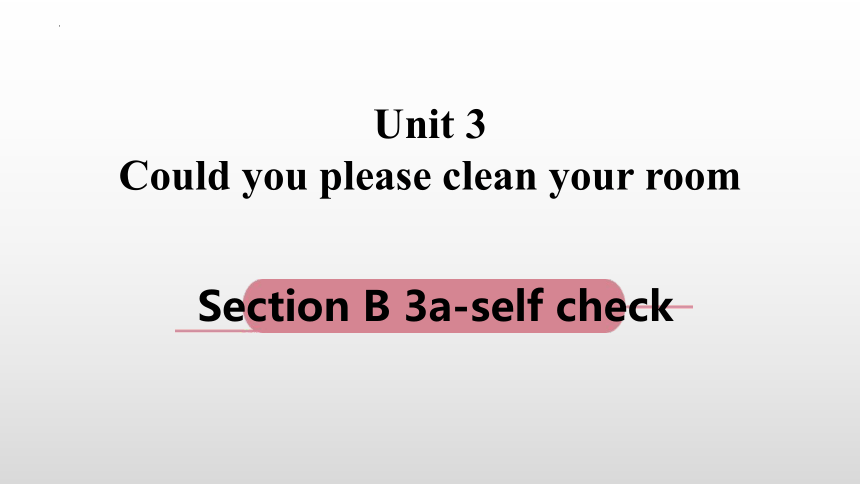 | |
| 格式 | pptx | ||
| 文件大小 | 291.0KB | ||
| 资源类型 | 教案 | ||
| 版本资源 | 人教新目标(Go for it)版 | ||
| 科目 | 英语 | ||
| 更新时间 | 2023-03-29 18:43:43 | ||
图片预览

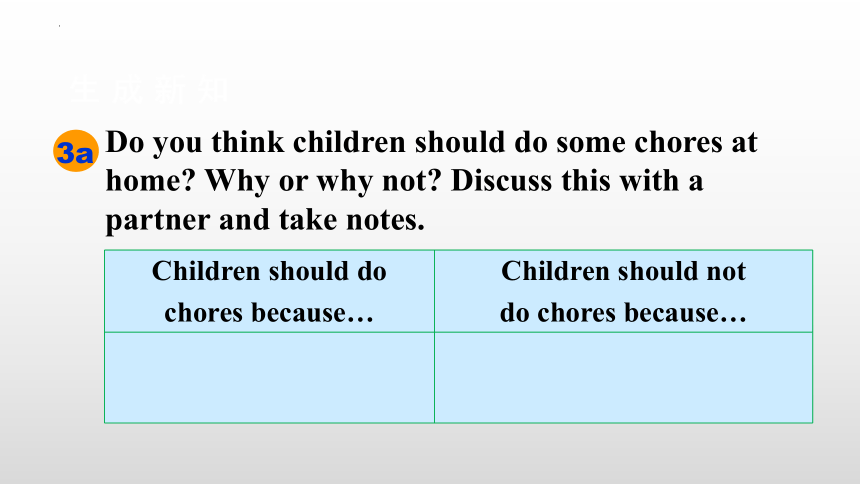
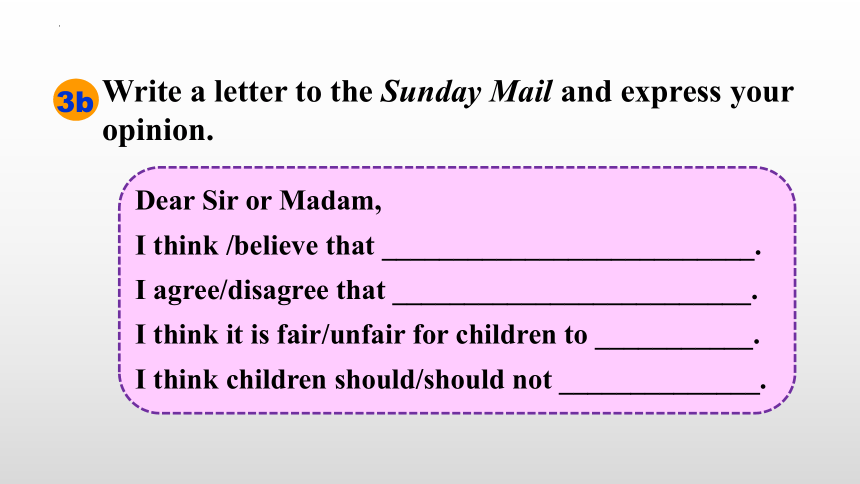
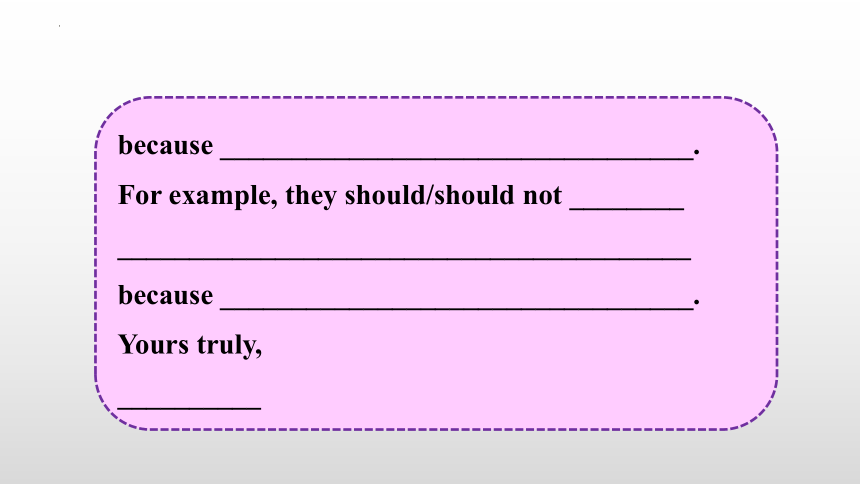
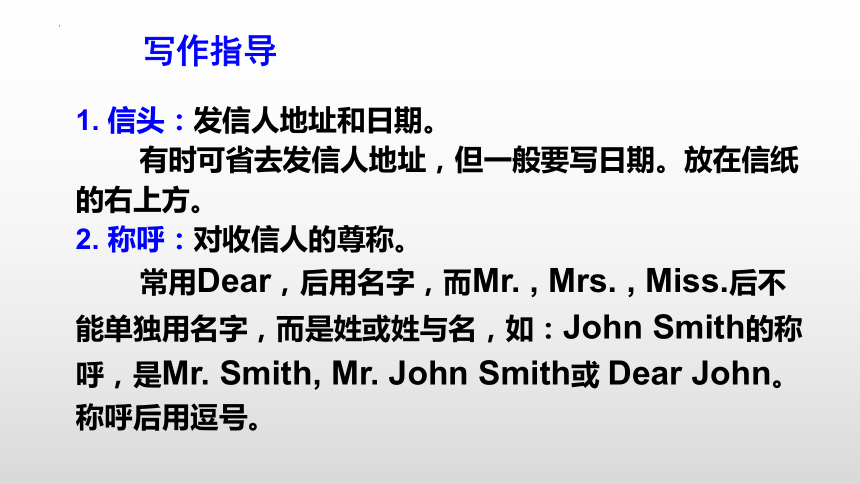
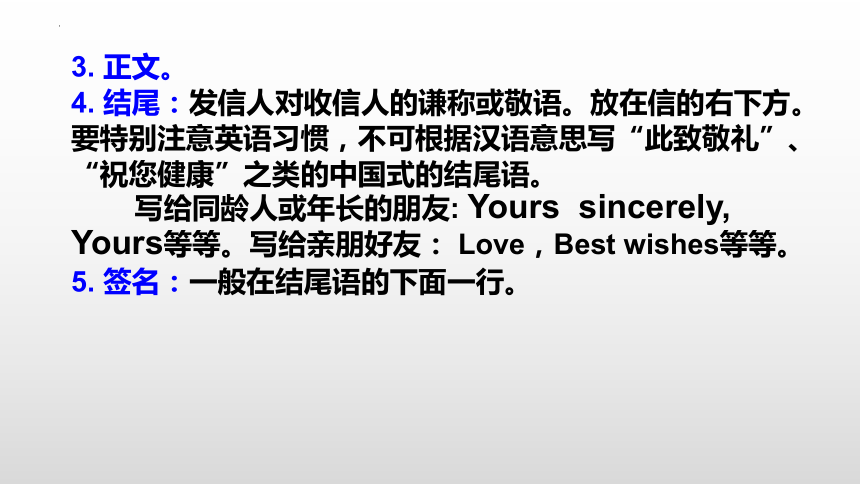
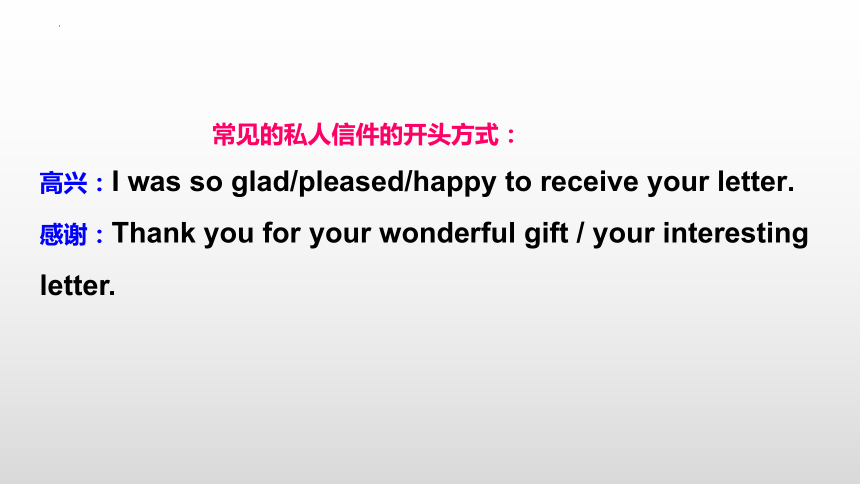
文档简介
(共18张PPT)
Unit 3
Could you please clean your room
Section B 3a-self check
生成新知
3a
Do you think children should do some chores at home Why or why not Discuss this with a partner and take notes.
Children should do chores because… Children should not
do chores because…
3b
Write a letter to the Sunday Mail and express your opinion.
Dear Sir or Madam,
I think /believe that __________________________.
I agree/disagree that _________________________.
I think it is fair/unfair for children to ___________.
I think children should/should not ______________.
because _________________________________.
For example, they should/should not ________
________________________________________
because _________________________________.
Yours truly,
__________
1. 信头:发信人地址和日期。
有时可省去发信人地址,但一般要写日期。放在信纸的右上方。
2. 称呼:对收信人的尊称。
常用Dear,后用名字,而Mr. , Mrs. , Miss.后不能单独用名字,而是姓或姓与名,如:John Smith的称呼,是Mr. Smith, Mr. John Smith或 Dear John。称呼后用逗号。
写作指导
3. 正文。
4. 结尾:发信人对收信人的谦称或敬语。放在信的右下方。要特别注意英语习惯,不可根据汉语意思写“此致敬礼”、“祝您健康”之类的中国式的结尾语。
写给同龄人或年长的朋友: Yours sincerely, Yours等等。写给亲朋好友: Love,Best wishes等等。
5. 签名:一般在结尾语的下面一行。
常见的私人信件的开头方式:
高兴:I was so glad/pleased/happy to receive your letter.
感谢:Thank you for your wonderful gift / your interesting letter.
关心与询问:How are you these days /
How are you getting on these days
How are you getting on with your
work/studies
抱歉:I am sorry that I did not write to you sooner but I have been very busy these days.
一般在表示道歉没有及时给对方写信时,还要简述原因或写上安慰的话。
遗憾:I was sorry to learn that you did not do well
in the examination. / I was so upset to hear
that you are ill these days. I do hope you are
getting better.
help with housework and chores at home
have enough stress from school
spend the time on school work in order to…
There is no need for them to…
It is important for sb. to do sth.
It’s not enough to…
develop children’s independence
The more…, the more…
参考句型
Self Check
1 Make a list of chores using these verbs.
1. do ______________________________
2. clean ____________________________
3. make ____________________________
4. fold _____________________________
5. sweep ___________________________
6. take out _________________________
do the dishes
clean the living room
make the bed
fold the clothes
sweep the floor
take out the rubbish
2 Are these polite requests or permission Write
the numbers in the correct places in the chart.
1. Could you please do your homework
2. Could I watch TV
3. Could you take out the rubbish first
4. Could I use your computer
5. Could I leave now
6. Could you come back before nine
Requests Permission
2
4
5
1
3
6
3 Use the questions in activity 2 to write a conversation.
A: _________________________________
B: _________________________________
A: _________________________________
_________________________________
…
Could you please do your homework.
Yes, I can. But can I watch TV first
No, you can’t. You must finish your homework first.
1. It is the parents’ job to provide a clean and comfortable environment at home for their children.
此处代词it仅为形式上的主语, 真正的主语是to provide … for their children。我们也可将It is one’s job (duty, …) to do something.视为一个固定的句型, 表示“做某事是某人的工作(职责等)”。如:
The movie theater provides us with good service.剧院提供给我们良好的服务。
His school provided a house for him.
学校提供给他一间房子。
provide sb with sth
provide sth for sb
2. And anyway, I think doing chores is not so difficult.
反正我觉得干点家务也不难。
anyway是一个副词, 若位于句首, 其后往往会有逗号将其与句子的其他内容隔开。anyway在此句中的作用是追加评论, 相当于汉语的“反正; 仍然; 依然”。如:
Sam didn’t get the job, but he’s not unhappy because it didn’t pay well anyway.
萨姆没有得到那份工作, 但他并没有闷闷不乐, 反正薪酬也不算高。
anyway还可用来表示“不管怎样; 无论如何”之意。例如:
It’s just a cold. But anyway, you should still see the doctor.
这只不过是感冒, 但不管怎样, 你还是应该看看医生。
根据句意和首字母提示完成单词。
1. He h____ doing the dishes. He thinks it’s boring.
2. I n____ some help. Could you help me
3. To keep the floor clean, I usually s_____ the floor twice a week.
4. What a mess (杂乱)! Could you please f___ your
clothes, David
hates
need
sweep
fold
Exercise
Unit 3
Could you please clean your room
Section B 3a-self check
生成新知
3a
Do you think children should do some chores at home Why or why not Discuss this with a partner and take notes.
Children should do chores because… Children should not
do chores because…
3b
Write a letter to the Sunday Mail and express your opinion.
Dear Sir or Madam,
I think /believe that __________________________.
I agree/disagree that _________________________.
I think it is fair/unfair for children to ___________.
I think children should/should not ______________.
because _________________________________.
For example, they should/should not ________
________________________________________
because _________________________________.
Yours truly,
__________
1. 信头:发信人地址和日期。
有时可省去发信人地址,但一般要写日期。放在信纸的右上方。
2. 称呼:对收信人的尊称。
常用Dear,后用名字,而Mr. , Mrs. , Miss.后不能单独用名字,而是姓或姓与名,如:John Smith的称呼,是Mr. Smith, Mr. John Smith或 Dear John。称呼后用逗号。
写作指导
3. 正文。
4. 结尾:发信人对收信人的谦称或敬语。放在信的右下方。要特别注意英语习惯,不可根据汉语意思写“此致敬礼”、“祝您健康”之类的中国式的结尾语。
写给同龄人或年长的朋友: Yours sincerely, Yours等等。写给亲朋好友: Love,Best wishes等等。
5. 签名:一般在结尾语的下面一行。
常见的私人信件的开头方式:
高兴:I was so glad/pleased/happy to receive your letter.
感谢:Thank you for your wonderful gift / your interesting letter.
关心与询问:How are you these days /
How are you getting on these days
How are you getting on with your
work/studies
抱歉:I am sorry that I did not write to you sooner but I have been very busy these days.
一般在表示道歉没有及时给对方写信时,还要简述原因或写上安慰的话。
遗憾:I was sorry to learn that you did not do well
in the examination. / I was so upset to hear
that you are ill these days. I do hope you are
getting better.
help with housework and chores at home
have enough stress from school
spend the time on school work in order to…
There is no need for them to…
It is important for sb. to do sth.
It’s not enough to…
develop children’s independence
The more…, the more…
参考句型
Self Check
1 Make a list of chores using these verbs.
1. do ______________________________
2. clean ____________________________
3. make ____________________________
4. fold _____________________________
5. sweep ___________________________
6. take out _________________________
do the dishes
clean the living room
make the bed
fold the clothes
sweep the floor
take out the rubbish
2 Are these polite requests or permission Write
the numbers in the correct places in the chart.
1. Could you please do your homework
2. Could I watch TV
3. Could you take out the rubbish first
4. Could I use your computer
5. Could I leave now
6. Could you come back before nine
Requests Permission
2
4
5
1
3
6
3 Use the questions in activity 2 to write a conversation.
A: _________________________________
B: _________________________________
A: _________________________________
_________________________________
…
Could you please do your homework.
Yes, I can. But can I watch TV first
No, you can’t. You must finish your homework first.
1. It is the parents’ job to provide a clean and comfortable environment at home for their children.
此处代词it仅为形式上的主语, 真正的主语是to provide … for their children。我们也可将It is one’s job (duty, …) to do something.视为一个固定的句型, 表示“做某事是某人的工作(职责等)”。如:
The movie theater provides us with good service.剧院提供给我们良好的服务。
His school provided a house for him.
学校提供给他一间房子。
provide sb with sth
provide sth for sb
2. And anyway, I think doing chores is not so difficult.
反正我觉得干点家务也不难。
anyway是一个副词, 若位于句首, 其后往往会有逗号将其与句子的其他内容隔开。anyway在此句中的作用是追加评论, 相当于汉语的“反正; 仍然; 依然”。如:
Sam didn’t get the job, but he’s not unhappy because it didn’t pay well anyway.
萨姆没有得到那份工作, 但他并没有闷闷不乐, 反正薪酬也不算高。
anyway还可用来表示“不管怎样; 无论如何”之意。例如:
It’s just a cold. But anyway, you should still see the doctor.
这只不过是感冒, 但不管怎样, 你还是应该看看医生。
根据句意和首字母提示完成单词。
1. He h____ doing the dishes. He thinks it’s boring.
2. I n____ some help. Could you help me
3. To keep the floor clean, I usually s_____ the floor twice a week.
4. What a mess (杂乱)! Could you please f___ your
clothes, David
hates
need
sweep
fold
Exercise
同课章节目录
- Unit 1 What's the matter?
- Section A
- Section B
- Unit 2 I'll help to clean up the city parks.
- Section A
- Section B
- Unit 3 Could you please clean your room?
- Section A
- Section B
- Unit 4 Why don't you talk to your parents?
- Section A
- Section B
- Unit 5 What were you doing when the rainstorm came
- Section A
- Section B
- Review of Units 1-5
- Unit 6 An old man tried to move the mountains.
- Section A
- Section B
- Unit 7 What's the highest mountain in the world?
- Section A
- Section B
- Unit 8 Have you read Treasure Island yet?
- Section A
- Section B
- Unit 9 Have you ever been to a museum?
- Section A
- Section B
- Unit 10 I've had this bike for three years.
- Section A
- Section B
